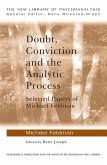Inspired by many successful years of teaching to analysts in training, Franco De Masi has selected the most significant lessons and added a few new ones to provide an enriching discussion of psychopathology and psychoanalytic clinical work. Lessons in Psychoanalysis begins with a general discussion of the scientific status of psychoanalysis, its main theories and models, and the way in which the unconscious registers emotional reality. These are followed by detailed chapters on key topics which relate more closely to clinical work. De Masi begins with the problem of diagnosis in psychoanalysis and the importance of a patient's clinical history. He then turns his attention to transference and the analytic relationship, which he views as central to clinical work, followed by chapters on the analytic impasse and the use of countertransference. He then deals with other vital themes: regression, anxiety, phobia and panic, trauma, depersonalisation in the various syndromes, melancholic and non-melancholic depression, narcissism, and psychic withdrawal. He concludes with some final considerations of analytic therapy. De Masi makes clear that analytic concepts are not linear but formed over time from numerous contributions. To demonstrate this, he provides a description of how ideas evolved to form a concept. Following the trajectory enables a fuller understanding and demonstrates the flexibility of analytic concepts to incorporate new contributions without losing meaning. De Masi also includes data from neuroscientific research on certain phenomena to broaden the discussion and demonstrate what is happening in other related fields. His work shows that psychoanalysis has the capacity to be a unitary body which allows various models and theories to coexist even where disagreement may arise. This book is essential reading for trainee psychoanalysts and students, and highly recommended for qualified professionals who continue to question analytic practice and theory.
Dieser Download kann aus rechtlichen Gründen nur mit Rechnungsadresse in A, B, BG, CY, CZ, D, DK, EW, E, FIN, F, GR, HR, H, IRL, I, LT, L, LR, M, NL, PL, P, R, S, SLO, SK ausgeliefert werden.









